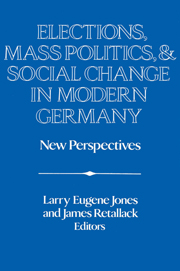Book contents
- Frontmatter
- Introduction
- PART ONE ELECTORAL POLITICS IN AN AUTHORITARIAN REGIME
- 1 Interpreting Wilhelmine Elections
- 2 Antisocialism and Electoral Politics in Regional Perspectivey
- 3 The Liberal Power Monopoly in the Cities of Imperial Germany
- 4 Reichstag Elections in the Kaiserreich
- PART TWO GENDER, IDENTITY, AND POLITICAL PARTICIPATION
- PART THREE LOCAL DIMENSIONS OF POLITICAL CULTURE
- PART FOUR THE NATIONAL PERSPECTIVE CONTINUITIES AND DISCONTINUITIES
- Index
3 - The Liberal Power Monopoly in the Cities of Imperial Germany
Published online by Cambridge University Press: 05 January 2013
- Frontmatter
- Introduction
- PART ONE ELECTORAL POLITICS IN AN AUTHORITARIAN REGIME
- 1 Interpreting Wilhelmine Elections
- 2 Antisocialism and Electoral Politics in Regional Perspectivey
- 3 The Liberal Power Monopoly in the Cities of Imperial Germany
- 4 Reichstag Elections in the Kaiserreich
- PART TWO GENDER, IDENTITY, AND POLITICAL PARTICIPATION
- PART THREE LOCAL DIMENSIONS OF POLITICAL CULTURE
- PART FOUR THE NATIONAL PERSPECTIVE CONTINUITIES AND DISCONTINUITIES
- Index
Summary
In the past historians have often started from the assumption that the decline of the liberal parties during the last decades of the nineteenth century indicated a lack of liberal sentiments and liberal commitment in German society. According to this view political liberalism never really established itself in Germany. Consequently the so-called liberal era of the 1860s was followed by a return to conservative politics during the 1880s and 1890s. The resurgence of the conservative parties combined with a shift in Bismarckian policies to produce what some historians have called the second or conservative foundation of the German Empire. Some historians have also argued that contemporary chauvinist, antisemitic, and conservative authors encouraged this supposed development with their attacks on economic and political liberalism. However it is difficult to assess how extensive their influence really was. Other historians have pointed to the economic crisis after 1873 as another possible cause for the shift towards conservatism in the 1880s. As a consequence economic and, in its wake, political liberalism were apparently weakened. Although a case can be made in favor of this rather deterministic view, it does not do justice to the complex relationship between economic and political liberalism and its place in Imperial Germany. Other historians have tended to emphasize a change in political style and political attitudes. According to them the constitutional practice of the new German Empire, Bismarck's manipulative and authoritarian style of politics and the continuation of Junker predominance in Prussia were responsible for a shift towards conservatism in the 1880s. In addition, ostracism of the socialist party and of the trade union movement has been seen as a sign of a repressive regime which felt strong enough to withstand the gradually declining challenge of political and economic liberalism.
- Type
- Chapter
- Information
- Elections, Mass Politics and Social Change in Modern GermanyNew Perspectives, pp. 93 - 118Publisher: Cambridge University PressPrint publication year: 1992
- 2
- Cited by



